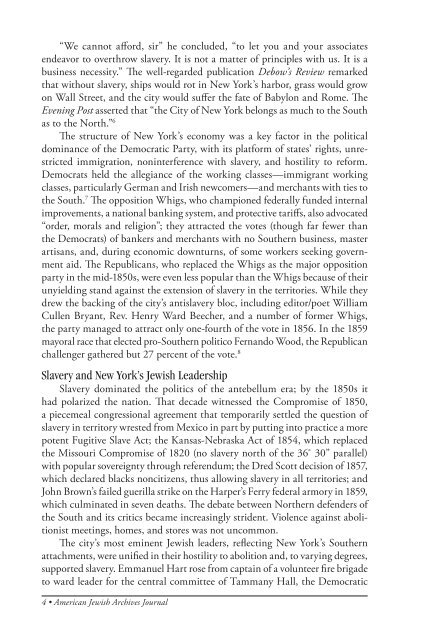American Jewish Archives Journal, Volume 64, Numbers 1 & 2
American Jewish Archives Journal, Volume 64, Numbers 1 & 2
American Jewish Archives Journal, Volume 64, Numbers 1 & 2
You also want an ePaper? Increase the reach of your titles
YUMPU automatically turns print PDFs into web optimized ePapers that Google loves.
“We cannot afford, sir” he concluded, “to let you and your associates<br />
endeavor to overthrow slavery. It is not a matter of principles with us. It is a<br />
business necessity.” The well-regarded publication Debow’s Review remarked<br />
that without slavery, ships would rot in New York’s harbor, grass would grow<br />
on Wall Street, and the city would suffer the fate of Babylon and Rome. The<br />
Evening Post asserted that “the City of New York belongs as much to the South<br />
as to the North.” 6<br />
The structure of New York’s economy was a key factor in the political<br />
dominance of the Democratic Party, with its platform of states’ rights, unrestricted<br />
immigration, noninterference with slavery, and hostility to reform.<br />
Democrats held the allegiance of the working classes—immigrant working<br />
classes, particularly German and Irish newcomers—and merchants with ties to<br />
the South. 7 The opposition Whigs, who championed federally funded internal<br />
improvements, a national banking system, and protective tariffs, also advocated<br />
“order, morals and religion”; they attracted the votes (though far fewer than<br />
the Democrats) of bankers and merchants with no Southern business, master<br />
artisans, and, during economic downturns, of some workers seeking government<br />
aid. The Republicans, who replaced the Whigs as the major opposition<br />
party in the mid-1850s, were even less popular than the Whigs because of their<br />
unyielding stand against the extension of slavery in the territories. While they<br />
drew the backing of the city’s antislavery bloc, including editor/poet William<br />
Cullen Bryant, Rev. Henry Ward Beecher, and a number of former Whigs,<br />
the party managed to attract only one-fourth of the vote in 1856. In the 1859<br />
mayoral race that elected pro-Southern politico Fernando Wood, the Republican<br />
challenger gathered but 27 percent of the vote. 8<br />
Slavery and New York’s <strong>Jewish</strong> Leadership<br />
Slavery dominated the politics of the antebellum era; by the 1850s it<br />
had polarized the nation. That decade witnessed the Compromise of 1850,<br />
a piecemeal congressional agreement that temporarily settled the question of<br />
slavery in territory wrested from Mexico in part by putting into practice a more<br />
potent Fugitive Slave Act; the Kansas-Nebraska Act of 1854, which replaced<br />
the Missouri Compromise of 1820 (no slavery north of the 36˚ 30” parallel)<br />
with popular sovereignty through referendum; the Dred Scott decision of 1857,<br />
which declared blacks noncitizens, thus allowing slavery in all territories; and<br />
John Brown’s failed guerilla strike on the Harper’s Ferry federal armory in 1859,<br />
which culminated in seven deaths. The debate between Northern defenders of<br />
the South and its critics became increasingly strident. Violence against abolitionist<br />
meetings, homes, and stores was not uncommon.<br />
The city’s most eminent <strong>Jewish</strong> leaders, reflecting New York’s Southern<br />
attachments, were unified in their hostility to abolition and, to varying degrees,<br />
supported slavery. Emmanuel Hart rose from captain of a volunteer fire brigade<br />
to ward leader for the central committee of Tammany Hall, the Democratic<br />
4 • <strong>American</strong> <strong>Jewish</strong> <strong>Archives</strong> <strong>Journal</strong>
















